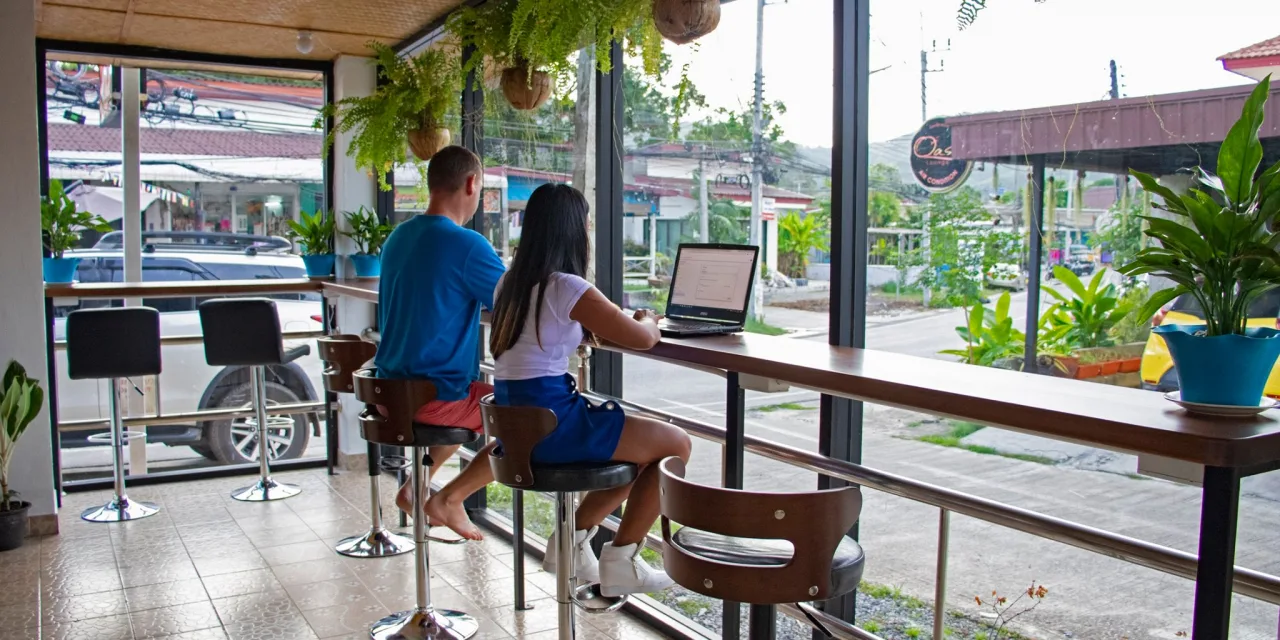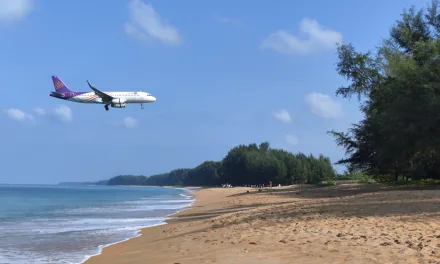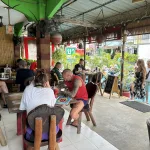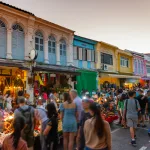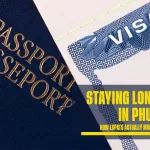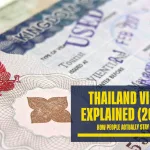Table of Contents
Table of Contents
A New Chapter for Remote Workers in Thailand
Over the past few years, Thailand has quietly become one of the world’s favorite places for remote workers. Whether it’s the stunning beaches, rich culture, or spicy noodle bowls served for less than the price of a latte, this country has long attracted digital nomads—even if they’ve technically been stretching tourist visas to make it work.
But that might be changing.
In July 2024, Thailand officially launched the Destination Thailand Visa (DTV) — a new visa designed with remote workers, freelancers, and location-independent entrepreneurs in mind. Unlike traditional visas that limited nomads to quick stays and visa runs, this one opens the door to longer, more stable living — all while keeping the island lifestyle that brought many of us here in the first place.
If you’re based in Phuket, or thinking about making the move, the DTV could reshape what life (and work) on the island looks like — from visa runs and rental options to community growth and economic opportunity.
So what’s actually included in this new visa? Who qualifies? And how might this change Phuket’s future?
Let’s break it down — no jargon, just the essentials.
Understanding the Destination Thailand Visa (DTV)
The Destination Thailand Visa (DTV) is Thailand’s most promising move yet to welcome remote workers and digital nomads with open arms — and more importantly, with official paperwork.
This visa isn’t just about extending your stay. It’s about giving you permission to live and work remotely from Thailand with peace of mind, without the usual visa-run headaches or legal gray zones.
Here’s what we know about the DTV so far:
✅ Visa Overview
- Type: Long-stay visa for digital nomads and remote professionals
- Duration: Valid for 5 years with multiple entries
- Stay Limit: Up to 180 days per entry, extendable once per stay
- Who It’s For:
- Remote employees or freelancers working for non-Thai companies
- Entrepreneurs, consultants, creatives — anyone with a legit income source abroad
- Also includes people participating in “soft power” activities like Muay Thai training, Thai cooking courses, wellness retreats, or medical tourism
- Remote employees or freelancers working for non-Thai companies
💰 Financial Requirements
- Must be 20 years or older
- Proof of savings: 500,000 THB (~$14,400 USD)
- Health insurance may be required (depending on your country of origin or activity type)
- Tax status still somewhat unclear — but the visa is not a work permit for Thai-based employment
📝 How to Apply
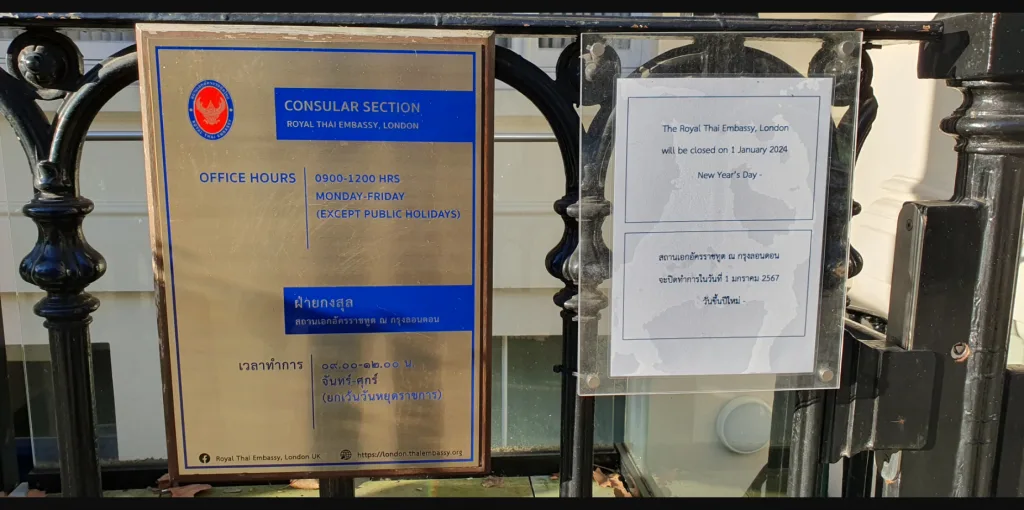
- Not available inside Thailand — apply through the official e-Visa portal or at a Thai embassy or consulate abroad
- May require:
- Proof of remote employment or portfolio
- Financial statements
- Insurance documentation
- Copies of your passport and digital nomad intentions (yes, really)
- Proof of remote employment or portfolio
- Processing times vary — check with your local Thai consulate for details
🔗 Source: ThaiEmbassy.com – Destination Thailand Visa Guide
It’s still early days for the DTV, so the details may evolve — but it’s a clear sign that Thailand wants to attract higher-earning, longer-term digital residents.
Why Phuket is Perfectly Positioned to Benefit
Phuket isn’t just Thailand’s biggest island — it’s also one of the most naturally suited places to welcome a wave of long-stay digital nomads. While Bangkok might be the country’s tech and startup hub, Phuket offers something a growing number of remote workers are craving: balance.
Here’s why the DTV could accelerate Phuket’s rise as a remote work paradise:
🏝️ 1. Lifestyle First, Hustle Second
Remote workers often choose destinations that support both work productivity and quality of life — and Phuket delivers. Where else can you finish a Zoom call and be paddleboarding 15 minutes later?
Add in healthy food, beach walks, and more yoga studios per square kilometer than probably anywhere else in Thailand, and it’s easy to see the appeal.
Want a post-work recharge? Here’s where to take an ice bath in Phuket.
⚡ 2. Infrastructure That’s Already In Place
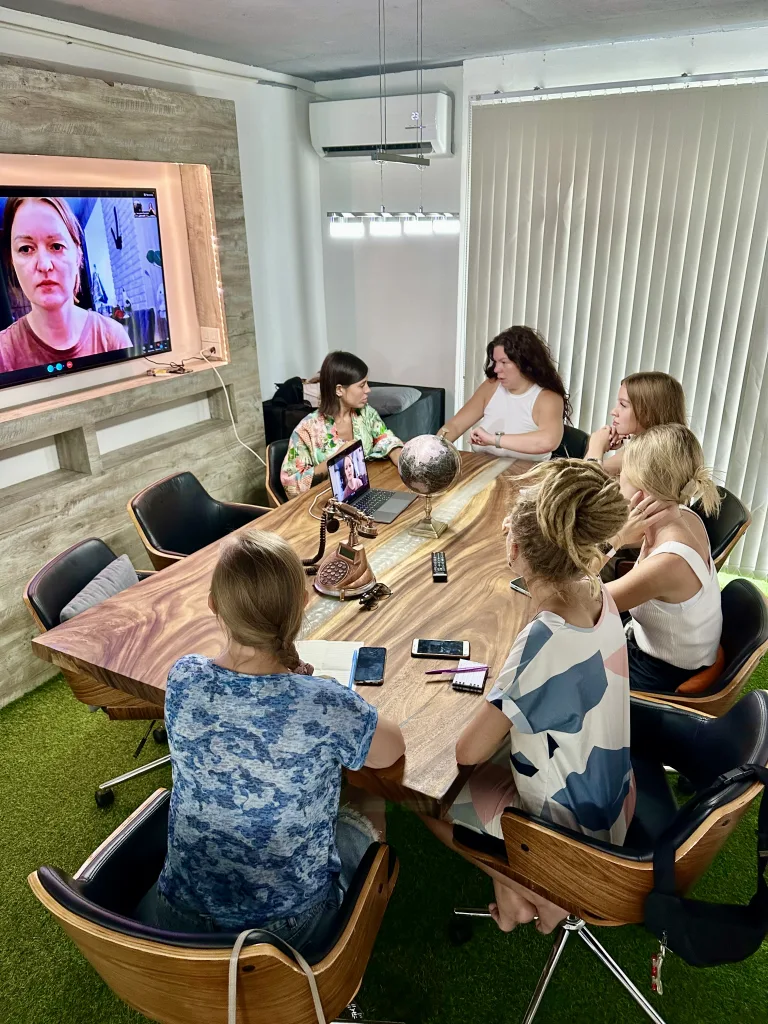
Phuket’s remote work infrastructure has matured rapidly in recent years:
- Reliable high-speed internet in most areas (especially Rawai, Chalong, Cherng Talay, and Kathu)
- Coworking spaces like The Project, Let’s Work, Grind Time, Garage Society, CocoVille, HOMA and more springing up.
- Cafés that welcome laptops and longer stays (with strong iced lattes to match)
- Monthly networking events, crypto meetups, and small-scale founders’ gatherings
✈️ 3. International Accessibility
Phuket has a major international airport, which means visa holders can base themselves here and still fly easily to and from major hubs like Singapore, Kuala Lumpur, or Bangkok. The DTV allows multiple entries, so that accessibility matters more than ever.
💬 4. Welcoming Community & Global Vibe
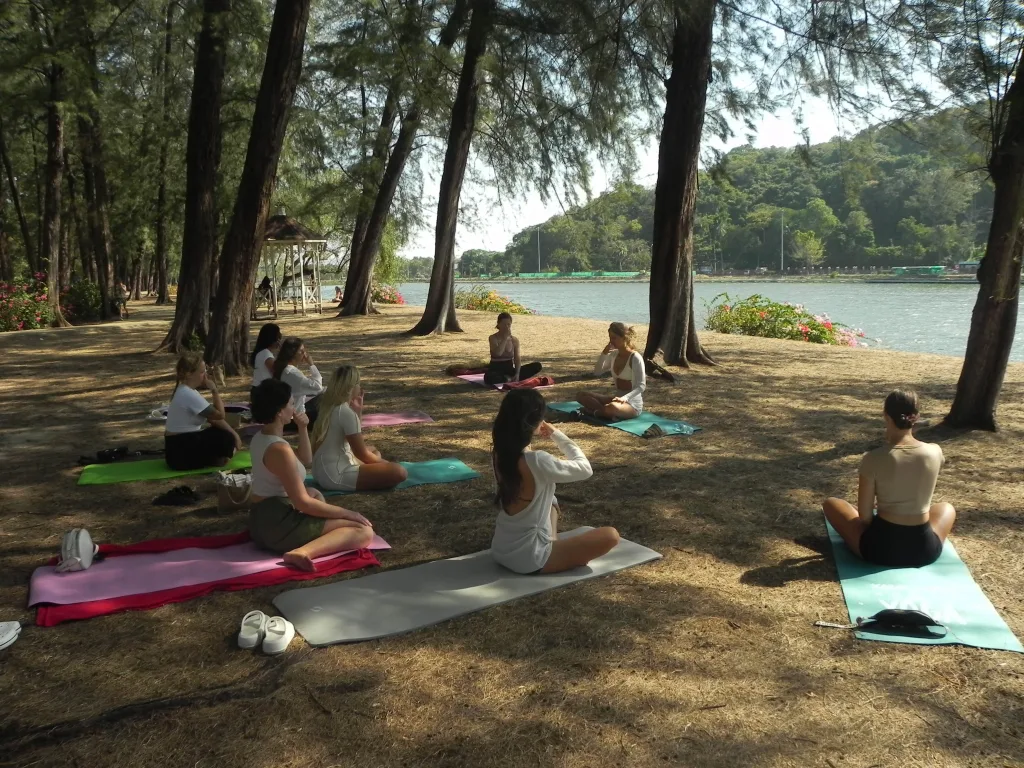
With a solid mix of long-term expats, seasonal nomads, and short-term tourists, Phuket’s social fabric is diverse, easygoing, and welcoming. English is widely spoken, there’s a growing number of family-friendly services, and you’ll find everything from vegan food trucks to French bakeries — all run by global citizens who now call Phuket home.
💸 5. Affordability & Comfort
Compared to other digital nomad hotspots like Lisbon, Bali, or Mexico City, Phuket offers a competitive cost of living — without skimping on comfort.
- Spacious apartments for $500–$800/month
- Local meals under $3
- Wellness services (like massages and fitness classes) that are both accessible and world-class
The bottom line? Phuket is already a great place for remote workers — the DTV just makes it official.
What Could Change If This Visa Rolls Out?
If the Destination Thailand Visa (DTV) gains traction — and all signs suggest it will — Phuket could see some noticeable shifts in its local economy, infrastructure, and community vibe. Here’s what might be on the horizon:
✅ More Long-Term Remote Residents
Forget short-stay tourists hopping between islands — the DTV is tailored for people who want to stay, work, and integrate.
- Expect to see more remote workers setting up shop for 3–6 months at a time, or even year-round
- Greater stability means they’ll seek deeper community ties, language learning, and local services
This shift from transience to semi-permanence could help balance Phuket’s seasonality, especially in quieter months. If you’re curious, here’s how to make the most of the rainy season.
🏠 Real Estate + Rental Trends Will Shift
Longer stays = different housing needs. Expect demand to rise for:
- One-bedroom or two-bedroom apartments with workspaces
- Mid-range villas with reliable Wi-Fi and monthly rates
- Coliving spaces and boutique developments aimed at digital nomads
Property developers and landlords may start optimizing listings for “remote worker friendly” amenities — like blackout curtains, ergonomic chairs, and fiber internet.
🏢 Coworking and Café Culture Will Boom
Phuket already has a healthy base of coworking spaces, but if DTV adoption increases, expect:
- New coworking brands and flexible memberships
- Café-turned-work-lounge hybrids (hello, smoothie bowls + strong Wi-Fi)
- More networking events, founder dinners, pitch nights, and skills workshops
You’ll also likely see growth in services that support remote work, like laptop repair shops, mobile SIM upgrades, and productivity coaching.
💸 Higher-Spending Visitors
Unlike short-term backpackers or tourists, many DTV holders are:
- Mid-career professionals earning solid incomes from overseas
- Entrepreneurs and consultants with disposable income
- People who spend on wellness, private healthcare, long-term rentals, and education
This means more business for local service providers: gym memberships, coworking passes, private drivers, pet sitters, even business consultants.
Legitimacy and Legal Clarity = Confidence
Perhaps one of the biggest shifts will be emotional and psychological:
People who were once living in visa limbo or doing “border runs” will finally have a legitimate way to stay. That alone creates:
- A stronger sense of belonging
- Confidence to invest in local projects
- Interest in contributing to the community (volunteering, creating jobs, collaborating)
Potential Challenges or Trade-offs
While the Destination Thailand Visa (DTV) brings exciting opportunities for Phuket, it’s not all sunshine and mango smoothies. Like any major shift, it comes with trade-offs that locals, businesses, and even nomads themselves should keep in mind.
🏡 Rising Cost of Living & Gentrification
With more high-earning remote workers coming in, rental prices in popular areas like Cherng Talay, Rawai, and Kata may continue to climb.
- Local residents and long-term expats on modest incomes could feel the squeeze.
- There’s a risk of over-touristification of certain neighborhoods, especially if developers cater only to foreign tastes. (Also see: How cheap is Phuket if you visit now?)
Balancing local affordability with economic growth will be a key tension.
🚧 Infrastructure Strain
Phuket’s charm is its island lifestyle — but it’s still a small island with:
- Limited public transport
- Patchy waste management in certain zones
- Occasional power outages and drainage issues during rainy season
A spike in long-stay residents could stress existing infrastructure, especially during high season or heavy rainfall months.
⚖️ Visa Ambiguity & Legal Gray Zones
While the DTV offers a major step forward, some key details remain unclear:
- Are DTV holders subject to Thai taxes? What if they earn income from multiple sources?
- Can freelancers with multiple clients qualify without a single contract?
- What happens if they begin working on Thai-based projects or businesses?
Until immigration and revenue authorities align fully, visa holders may still face uncertainty when opening bank accounts, signing leases, or filing taxes.
🧠 Cultural Tensions & Integration
Phuket has always been a crossroads of cultures — but not every influx is friction-free. Potential cultural frictions include:
- Nomads forming bubbles or failing to engage meaningfully with Thai communities
- Assumptions about local pricing, language use, or service expectations
- Environmental footprint: overuse of scooters, plastic consumption, etc. That said, this is also a moment to build bridges, not just cafés. If that bridge leads to cocktails, this guide to Phuket’s best bars might help.
That said, this is also a moment to build bridges, not just cafés.
Despite these challenges, Phuket is better positioned than most places in Thailand to adapt thoughtfully — and benefit significantly if done right.
Final Thoughts: Embracing the Opportunity
The Destination Thailand Visa (DTV) is more than a paperwork upgrade — it’s a signal. Thailand is opening its doors to a new class of remote residents who want more than a vacation, and Phuket is uniquely poised to welcome them.
For years, the island has attracted creatives, solopreneurs, developers, consultants, and digital wanderers. But until now, many were living in a legal gray area — stuck on tourist visas, juggling border runs, or quietly overstaying their welcome. The DTV changes that narrative.
It gives remote workers the dignity of being seen, and it gives Phuket a chance to build around a growing global trend: people who work from anywhere but want to live somewhere special.
Done right, this could mean:
- More year-round business for local cafes, coworking spaces, and wellness centers
- More long-term community building among expats and Thai locals alike
- More investment in sustainable infrastructure, creative culture, and slow travel values
But it’ll take intention — from nomads who want to integrate, from developers who want to build smart, and from local leaders who see this as a chance to shape Phuket’s next chapter, not just monetize it.
And hey, if all else fails, we still have the best sunset spots, chicken rice, and mango sticky rice in Southeast Asia. 🌅🐔🥭
How Does the DTV Stack Up?
Not sure if the new Destination Thailand Visa is right for you? Here’s a quick side-by-side look at how it compares to the standard Tourist Visa and the more traditional Non-Immigrant ‘O’ Business Visa. From re-entry rules to work permissions, this table breaks down the essentials at a glance.
| Visa Type | Validity | Max Stay per Entry | Re-Entry | Work Permission | Financial Requirement | Application Location | Target Audience |
| Destination Thailand Visa (DTV) | 5 years | 180 days (extendable once) | Multiple entries allowed | No Thai employer income; remote/foreign work only | 500,000 THB savings | Outside Thailand | Remote workers, freelancers, digital nomads |
| Tourist Visa (TR) | 60 days (extendable to 90) | 60–90 days | Single or double entry (multi-entry available at extra cost) | Strictly no work allowed | None (but must show sufficient funds for stay) | Inside or outside Thailand | Tourists, short-stay visitors |
| Non-Immigrant ‘O’ (Business) Visa | 90 days (extendable up to 1 year) | 90 days to 1 year | Multiple re-entry permitted with re-entry permit | Work allowed with work permit | Depends on sponsor/company; no fixed amount | Typically outside Thailand | Foreign employees/businesspeople with Thai connections |
Resources & Further Reading
Want to dig deeper or explore whether the Destination Thailand Visa is a fit for you? These resources can help you understand the fine print — and keep up with the latest developments as Thailand refines its digital nomad offering:
🏛️ Official & Visa Guidance
- ThaiEmbassy.com – Destination Thailand Visa Overview
A practical summary of eligibility, requirements, and how to apply from one of the most reliable visa resource hubs. - Thailand E-Visa Portal
The official place to start your application — note that you must apply from outside of Thailand.
🌏 Digital Nomad Community Sources
- Nomads Embassy – Thailand Digital Nomad Visa Guide
Up-to-date insights and a breakdown for freelancers, entrepreneurs, and remote employees. - Freaking Nomads – Complete DTV Explainer
Simple, digestible coverage with frequently asked questions and use cases.
📍 Phuket-Specific Insights
- Why Phuket Is Becoming a Digital Nomad Hotspot
How the island is evolving to welcome long-stay remote workers. - [Phuket Coworking Map – Phuket Community Guide (coming soon)]
We’re curating a community map of Phuket’s best places to work remotely, from laptop-friendly cafes to full-scale coworking hubs.
🧠 For Tax + Legal Considerations
- Always consult a local legal advisor or international tax consultant for clarity on:
- Tax residency status
- Double taxation agreements
- Business registration for remote freelancers
- Tax residency status
If you want the latest updates as this visa evolves, subscribe to the Phuket Community newsletter, and we’ll keep you posted — without the jargon, and always with a beach-side vibe.
❓ FAQ: Thailand’s Digital Nomad Visa (DTV) & Living in Phuket
✅ What is the Destination Thailand Visa (DTV)?
The Destination Thailand Visa (DTV) is a new long-stay visa launched in 2024, designed specifically for remote workers, freelancers, and digital nomads. It allows multiple entries over five years, with stays of up to 180 days per visit, making it ideal for those who want to live and work remotely in Thailand legally.
🏝️ Can digital nomads live in Phuket with the DTV?
Yes! Phuket is one of the best places in Thailand for digital nomads using the DTV. The island offers strong internet, a growing coworking scene, and a vibrant expat community — making it a top choice for long-stay remote workers.
📅 How long can I stay in Thailand with the digital nomad visa?
With the DTV, you can stay in Thailand for up to 180 days per entry, and extend that stay once. The visa itself is valid for 5 years, with multiple entries allowed during that time.
💻 Can I work remotely in Thailand with the DTV visa?
Yes, but only for foreign-based companies or clients. The DTV allows digital nomads to work remotely from Thailand, but it does not permit employment by Thai companies unless you have a valid work permit.
💰 What are the financial requirements for the DTV?
Applicants must show proof of 500,000 THB (around $14,400 USD) in savings or assets. This helps demonstrate financial stability during your stay in Thailand.
✈️ Can I apply for the DTV while I’m already in Thailand?
No. You must apply for the DTV from outside Thailand, either via the Thai e-Visa platform or at a Thai embassy or consulate in your home country.
🧳 Is the digital nomad visa better than a tourist visa?
For remote workers and long-stay visitors, yes. The DTV allows for much longer, legal stays, multiple entries over several years, and the ability to work remotely, unlike the Tourist Visa, which typically limits you to 60–90 days and strictly forbids any work activity.
🏠 Will Phuket get more expensive with this visa?
Possibly. As more digital nomads move to Phuket, demand for housing, coworking, and services could increase prices in popular areas. However, the influx may also lead to better infrastructure and business opportunities.

